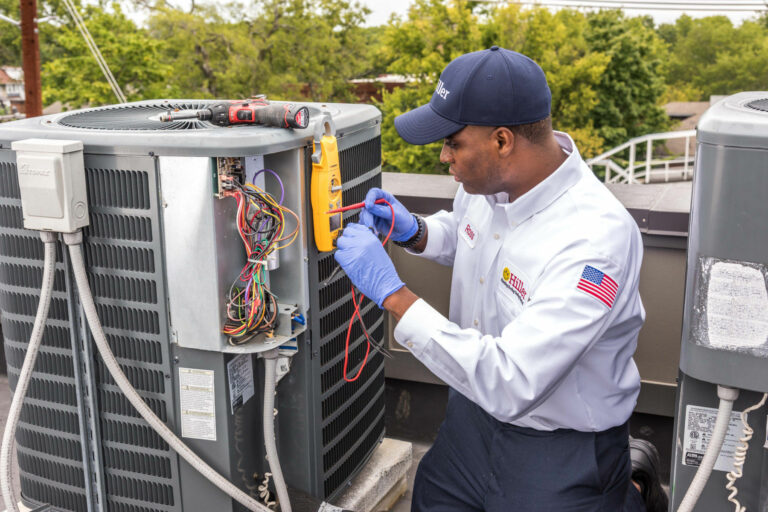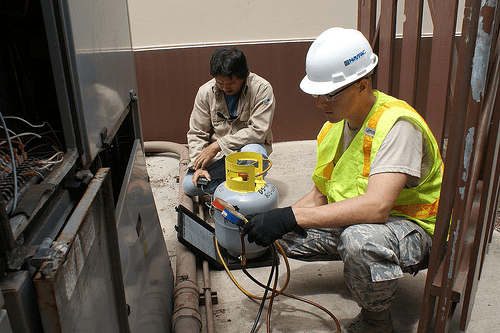Choosing the Right Model for heat pump installation ooltewah tn
Choosing the Right Model for heat pump installation ooltewah tn
Blog Article
Choosing Between a Warmth Pump and Heating System: Trick Factors To Consider for Your A/c Needs
When examining heating options for cooling and heating needs, the choice in between a heatpump and a furnace can be complicated. Each system supplies distinct benefits tailored to specific climates and power effectiveness objectives. Understanding these differences is essential for making an enlightened selection. Trick factors such as installation expenses and environmental effect additionally make complex the choice procedure. Which alternative truly straightens with one's convenience and sustainability choices? The complying with sections will certainly check out these considerations in information.
Understanding Heat Pumps: How They Work and Their Advantages
While lots of property owners take into consideration numerous home heating options, recognizing exactly how warmth pumps function and their benefits can substantially affect their decision. Warm pumps run by moving heat instead of generating it. In the winter, they draw out warmth from the outdoors air or ground and move it indoors, while in the summer season, they reverse this procedure, cooling down the home by expelling warm outside. This double capability makes them functional for year-round environment control.One of the main benefits of heat pumps is their power efficiency. They utilize significantly less power contrasted to standard heater, potentially resulting in reduced energy bills (heat pump installation ooltewah tn). In addition, heatpump have a smaller carbon impact, making them an eco-friendly choice. They also call for less upkeep than standard systems, adding to long-term price savings. In general, comprehending the auto mechanics and advantages of heatpump can help home owners make informed decisions regarding their heating and cooling requirements
Discovering Furnaces: Types, Operation, and Benefits
Heating systems can be found in different kinds, including gas, electric, and oil designs, each with distinctive operational systems. Recognizing these distinctions is necessary, as they affect performance and home heating efficiency. In addition, heating systems use countless benefits, such as regular warm outcome and dependability in chillier climates.
Kinds of Heating systems
Heater can differ significantly in style and procedure, with furnaces being a popular choice among property owners. There are a number of kinds of furnaces, each making use of different gas resources and innovations. Gas heating systems are typical, leveraging natural gas to generate warm effectively. Electric furnaces, on the various other hand, use electric resistance to create warmth, commonly favored for their straightforward setup. Oil furnaces, while much less common, are reliable in areas with minimal gas accessibility (heat pump service). In addition, condensing heating systems make best use of power effectiveness by capturing and recycling exhaust gases. Each kind operates via a system of heat exchangers and ductwork to disperse cozy air throughout a home. Comprehending the distinctions between these heater types is essential for notified heating and cooling choices
Advantages of Heaters
For home owners looking for trustworthy heat during chilly months, the advantages of heating systems are significant. Heaters provide regular heating, making sure even temperatures throughout the home. They are specifically effective in extreme chilly, frequently outperforming heatpump in cold problems. Various types, including gas, electric, and oil heating systems, supply adaptability to meet diverse requirements and preferences.Furnaces also have a tendency to have reduced first installment prices contrasted to heatpump, making them a more easily accessible alternative for several. Their durable layout adds to a much longer life-span, with several devices lasting over 15 years with correct upkeep. In addition, modern-day heaters are frequently furnished with innovative modern technology for improved efficiency, which can lead to decreased energy bills. Overall, heating systems stay a trustworthy option for efficient home heating.

Power Performance: Contrasting Warmth Pumps and Furnaces
When contrasting energy efficiency between warm pumps and heating systems, the Seasonal Power Efficiency Ratio (SEER) plays an essential duty in determining efficiency. In addition, an operational expense evaluation reveals the long-lasting financial effects of each system. Comprehending these aspects can direct property owners in making informed decisions regarding their heating solutions.
Seasonal Power Performance Ratio
Power performance plays a necessary role in the decision-making process between warmth pumps and furnaces, particularly when considering the Seasonal Power Performance Ratio (SEER) This metric steps the cooling performance of heatpump over a whole cooling season, supplying a standardized method to evaluate efficiency. Higher SEER ratings suggest higher energy performance, translating to lower power consumption and minimized energy bills. In contrast, heating systems are typically assessed using the Yearly Gas Application Effectiveness (AFUE) rating, which reflects home heating efficiency. When contrasting these two systems, property owners ought to focus on SEER rankings for heat pumps, as they straight effect overall energy cost savings and environmental sustainability. A complete understanding of SEER can especially influence the lasting contentment and cost-effectiveness of the selected heating and cooling service.
Functional Price Analysis
Comprehending the operational costs related to warm pumps and heaters is crucial for home visit their website owners examining their alternatives. Heat pumps normally supply higher energy performance, converting electric energy into warm with very little waste. This leads to lower monthly utility expenses, particularly check my site in modest climates. On the other hand, typical heating systems, specifically gas versions, might have reduced upfront prices yet can incur higher operational costs with time due to fuel prices and efficiency ratings.Moreover, heatpump can operate as both heating and cooling down systems, possibly lowering the demand for separate heating and cooling systems. While initial financial investments for warm pumps might be greater, their long-lasting savings in power effectiveness can make them a more affordable choice for many families. Mindful analysis of regional energy rates is vital to establish the very best alternative.
Installment Expenses: What to Expect for Each Home Heating System
Setup prices for furnace can vary substantially between warmth pumps and heating systems, influencing property owners' choices. Heatpump typically have greater upfront installment expenses, usually varying from $3,500 to $8,000, depending upon the unit dimension and intricacy of setup. This consists of the exterior system, indoor handling system, and essential ductwork modifications. On the other hand, furnaces have a tendency to have reduced preliminary costs, averaging in between $2,500 and $6,000, which can be appealing for budget-conscious home owners. Setup costs can raise if extensive ductwork is required.Moreover, the option of gas kind for furnaces-- all-natural gas, gas, or electrical-- can also impact setup expenses. While warm pumps supply energy efficiency, their preliminary financial investment might discourage some customers. Eventually, reviewing installment expenses together with long-lasting cost savings and effectiveness will help house owners in making notified decisions about their heating systems.
Climate Factors To Consider: Which System Performs Better in Your Location
Exactly how do climate problems affect the efficiency of furnace? The performance of heatpump and furnaces can differ greatly relying on the neighborhood climate. In moderate environments, warm pumps stand out by efficiently moving warm from the outside air, making them an energy-saving option. Nonetheless, their performance decreases in incredibly cold temperature levels, where they might struggle to remove adequate heat. Alternatively, heating systems, particularly gas versions, supply consistent and trusted warm no matter outdoor conditions, making them more suitable in cooler regions.In areas that experience milder winters months, warm pumps can run efficiently year-round, giving both heating & cooling. On the other hand, regions with extreme winters usually take advantage of the toughness of furnaces. Eventually, recognizing the local climate is crucial when choosing in between a heatpump and a heater, as it directly impacts their functional performance and overall performance.
Upkeep Demands: Long-Term Care for Heat Pumps vs. Furnaces
While both heatpump and heating systems need regular upkeep to ensure peak performance, their specific demands and care regimens vary significantly. Furnaces generally need much less frequent focus, with yearly examinations sufficing to examine for gas leakages, tidy filters, and examine overall capability. Their simpler design frequently permits simple repairs.In comparison, warm pumps necessitate semiannual maintenance because of their dual function in heating & cooling. This consists of cleaning coils, examining refrigerant degrees, and guaranteeing that both the interior and outside units work at their best. Furthermore, heatpump maintenance usually includes click to read more even more intricate elements, making expert maintenance essential.Neglecting maintenance can cause lessened efficiency and boosted power costs for both systems. Eventually, homeowners ought to take into consideration these long-lasting treatment needs when selecting between a warmth pump and a furnace, as aggressive maintenance can prolong the life expectancy and efficiency of either system substantially.
Environmental Impact: Selecting a Lasting Home Heating Choice
The ecological influence of furnace is an essential assessment for house owners looking for lasting alternatives. Warmth pumps are usually more energy-efficient than traditional heating systems, as they transfer heat as opposed to generate it, significantly decreasing carbon emissions. By utilizing renewable energy resources, such as air-source or geothermal warmth pumps, home owners can better decrease their eco-friendly footprint.On the various other hand, gas furnaces produce greenhouse gases and contribute to air contamination, though they commonly supply higher heat result. Nevertheless, developments in technology have actually caused the development of high-efficiency furnaces that reduce emissions.Ultimately, picking a heating unit involves weighing performance versus environmental influence. House owners are encouraged to review local power sources and rewards for eco-friendly systems, making sure a choice that lines up with both individual convenience and environmental duty. The decision affects not just immediate comfort yet also long-lasting sustainability and ecological health.
Often Asked Inquiries
For How Long Do Warmth Pumps and Furnaces Normally Last?
The lifespan of heatpump generally varies from 15 to 20 years, while heaters can last between 15 to three decades. Regular maintenance significantly influences their long life and efficiency in offering heating options.
Can I Make Use Of a Heatpump in Extremely Cold Climates?
Warm pumps can run in very cool environments, yet their performance diminishes as temperatures decline. In such problems, supplementary home heating resources might be essential to keep comfy interior temperature levels and guarantee peak efficiency.

What Is the Noise Degree of Warmth Pumps Versus Furnaces?
The noise levels of heatpump and furnaces vary significantly. Normally, heatpump run even more silently than standard heaters, making them better for those conscious seem, while furnaces might generate louder operational noises during heating cycles.
Are Warm Pumps Suitable for Both Heating and Cooling?
Warmth pumps are certainly ideal for both cooling and heating (ductless mini splits). They function by transferring heat, providing effective temperature control year-round, making them a flexible selection for property owners seeking an all-in-one heating and cooling service
What Size Furnace Do I Need for My Home?
Establishing the appropriate size furnace for a home requires examining variables such as square video, insulation high quality, local environment, and the home's format. Consulting an expert can ensure an accurate analysis and suitable comfort. Heat pumps generally offer greater power efficiency, transforming electric energy right into warm with very little waste. In moderate environments, warm pumps excel by effectively moving heat from the outdoors air, making them an energy-saving option. On the other hand, heating systems, particularly gas versions, provide dependable and consistent heat no matter of outside problems, making them preferable in cooler regions.In areas that experience milder winters months, heat pumps can run effectively year-round, supplying both home heating and cooling. Warm pumps are usually more energy-efficient than standard heaters, as they move heat rather than produce it, substantially reducing carbon discharges. By using eco-friendly power sources, such as geothermal or air-source warm pumps, house owners can better reduce their environmental footprint.On the other hand, natural gas heaters produce greenhouse gases and contribute to air pollution, though they commonly give greater warmth result.
Report this page